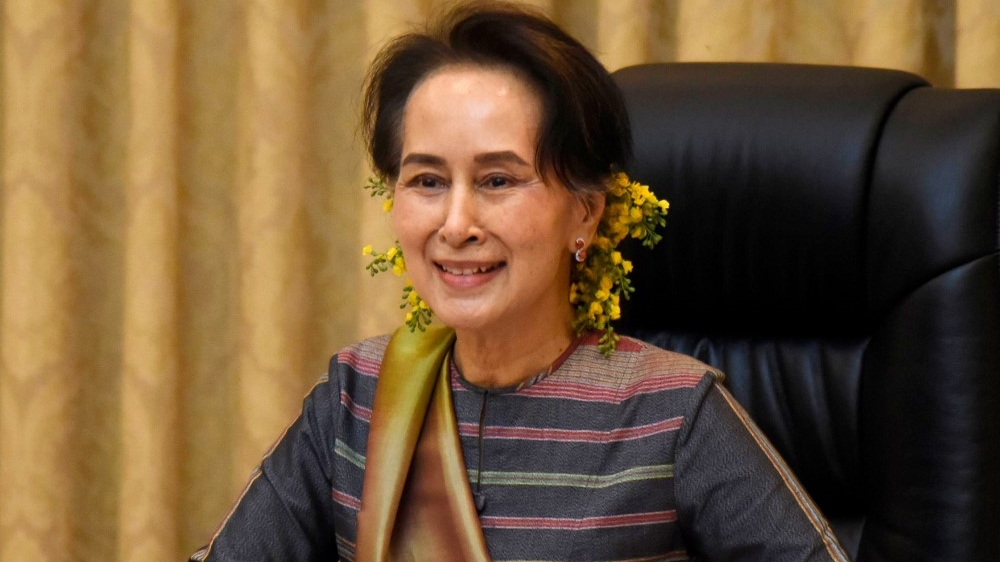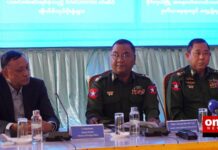The five-point statement released by State Counselor Aung San Suu Kyi on April 21 has infuriated and surprised many, as it is a testimony that she has transformed herself from being an alliance partner of the ethnic political parties (EPPs); mediator between the ethnic armed organizations (EAOs) and the Military or Tatmadaw; to an adversary of both the EPPs and EAOs.

The third point statement writes: “When the whole country’s government (servants), people, voluntaries are trying utmost to prevent, control and cure coronavirus disease (COVID-19), due to the terrorist group United League of Arakan/Arakan Army (ULA/AA) implementing destructive actions in Arakan State and Chin State, the Tatmadaw soldiers and officials, risking their lives and bravely discharging their duties, to protect the lives, homes and wealth of the people, are duly acknowledged and praised with honor.”(Unofficial translation by the writer.)
Let us now look at the different phases of Suu Kyi in her relationship with the EPPs, EAOs and in general with the ethnic nationalities. It goes without saying that National League for Democracy (NLD) is identified with Suu Kyi and the party is in no way seen as an institution, as it relies overwhelmingly on the her popularity and charismatic leadership.
CRPP
The Committee Representing the People’s Parliament (CRPP) was formed in 1998 by the NLD together with other political parties including the Shan Nationalities League for Democracy (SNLD), Arakan League for Democracy (ALD), Mon Democracy Party and Zomi National Congress, after the then ruling military junta refused to recognize a sweeping victory by the opposition in the country’s 1990 general election.
However, the committee was shut down by the end of 1998, as it propagated for the annulment of all laws promulgated since Sept 18, 1998 and called for the release of all political prisoners. The junta insisted on the dissolution of the CRPP as a pre-condition for the resumption of talks with the opposition.
In short, the NLD and EPPs were banded together hand-in-hand as comrades-in-arms during the reign of military junta and resisted to participate in drawing the Military-led constitution through the National Convention, taking years to finally finish in it in 2008, which the NLD and as well the most EPPs rejected. In process more than a hundred. of CRPP members were arrested and jailed for years.
Thein Sein era
NLD reentered the parliamentary arena in 2012, through by-elections and wining most of the 48 contested seats, due to the urging of the then President Thein Sein, head of the military-backed Union Solidarity and Development Party (USDP). The EPPs, particularly the SNLD and Arakan National Party (ANP) entered the fray in nationwide election of November 2015, which both did well. SNLD came out second after USDP in Shan State, with NLD coming out third, while the ANP won the most seats in Arakan State.
The loosening of restrictions by USDP government for the NLD to enter the parliament through by-elections was believed to aim at paving way to lift the decades-long Western imposed sanctions on Burma or Myanmar and also for the Military to gain legitimacy. Both aims were were achieved remarkably in less than a year in September 2016.
Important is to note that the Shan and Arakan parties proposed the NLD not to compete in ethnic states constituencies that they would contest. But it was shot down by the NLD, as it contested in all constituencies nationwide. And after the NLD landslide win in 2015 election, in which many of the ethnic electorates practiced tactical voting to give the NLD a majority so that military-drafted constitution could be amended, it refused to work as coalition with the EPPs but instead made cosmetic gesture by employing some ethnic individuals to some important governmental positions, like parliamentary speakers, for example.
The glaring disappointment for the EPPs was that the NLD didn’t appoint ANP chief minister in Arakan State, where it won the most vote. In the same vein, the SNLD was also sidelined in Shan State and instead the NLD appointed its own chief ministers and set up state governments in both Arakan and Shan states.
Moreover, the NLD professed national reconciliation was only carried out unevenly, but only solely with the Military, leaving out forming coalition with all with the EPPs. In fact, the NLD also didn’t need to form coalition with any party, as it already achieved an absolute majority. But the EPPs thought reconciliation should be on party to party basis coalition and not sort of doing individual favor.
As could be seen NLD opted to fill numerous important government postings with the people from the Military or ex-military officers. Even the people within the NLD were highly dissatisfied with Suu Kyi’s decision but could do nothing against the popular leader.
The EPPs could only complain indirectly for the inappropriate treatment of the one time alliance partner under military junta as the NLD and Suu Kyi’s strategy were to appease the Military and work out power-sharing mode than reconciliation with the EPPs, which today is still the NLD policy although it is not spelled out.
But with the EAOs, Suu Kyi did told them not to sign the nationwide ceasefire agreement (NCA) prior to the 2015 November election, giving incentive that they might gain more if she win and able to form government. In addition, she might have thought that Thein Sein’s achievement might boost USDP election out come, which is not in the NLD’s interest.
Luckily for Suu Kyi, the NCA was signed only with the 8 EAOs and the other 8 refused to sign, which is still the situation today. The reason behind EAOs refusal to sign was the Military won’t include three of the EAOs, stating that they were newly established outfits and cannot be allowed to sign.
Under NLD regime only 2 unimportant small EAOs, without armed troops, signed the NCA in 2018, while the rest non-NCA-signatories employing 80 percent of the total EAOs fighting force are left out in the cold.
NLD also tried to strike the posture of being a mediator between the EAOs, signatories and non-signatories alike, and the Military. But its inability to rein in regarding all-inclusive participation of all warring parties and its deafening silence on ongoing war in ethnic states, including gross human rights violations committed by the Military, worked against its preferred intermediary role.
NLD government era
During its four years in power, NLD was busy trying to appease the Military more than putting efforts on the amendment of constitution to become federal union. But when it finally did last month in March, its 114-point amendment didn’t include a single federal amendment proposal, proposed by the EPPs, notably the SNLD and ANP.
NLD election manifesto of 2015 slogan was “Time for Change”, promising internal peace in ethnic affairs; constitution that ensures that all the people in the country can live together in tranquility and security; a system of government that will fairly and justly defend the people; and finally freedom, security and prosperity.
And as all could see, nothing in the NLD election manifesto has been fulfilled. Worse still, it has actively turned from being a partner, wannabe mediator of the ethnic nationalities to adversary and even enemy.
What the ethnic nationalities say
Regarding Suu Kyi’s political posturing where Arakan conflict is concerned, the non-Bamar ethnic bloc is clearly disappointed to see her appraisal of the Tatmadaw, while condemning the AA in her recent statement.
Ethnic affairs analyst Maung Maung Soe thought the statement that the NLD has taken a particular side in the civil war will now become more difficult for the peace process to proceed.
Colonel Naw Bu, information officer of Kachin Independence Army (KIA) said Suu Kyi should not take sides with the Tatmadaw and that declaring AA as an unlawful association made the political dialogue impossible.
U Pe Than, Lower House lawmaker of Arakan National Party said: “The [government] needs to focus on peace talks. [The State Counselor] should have said political problems should be settled through peaceful means. That she views the one side as a terrorist group and praised the Tatmadaw does not push them to the negotiation table. She has taken the side of the Tatmadaw while labeling the AA as a terrorist group,” reported The Irrawaddy recently.
Lamai Gum Ja, a member of the Kachin Peace-Talk Creation Group (PCG) regarding the state counselor statement said: “The designation of AA as terrorist pushed the (peace) negotiation further away. If AA is no more included the KIA will have to make more adjustment within the Federal Political Negotiation and consultative Committee (FPNCC) as all are members. The condition to meet will become more further (harder).”
FPNCC is a seven-member political alliance made up of United Wa State Army (UWSA), National Democratic Alliance Army (NDAA), Shan State Progressive Party (SSPP), Kachin Independence Army (KIA), Ta’ang National Liberation Army (TNLA), Myanmar National Democratic Alliance Army (MNDAA) and Arakan Army (AA).
AA spokesman Khine Thuka said: “If analysis has to be made concerning Daw Aung San Suu Kyi statement, between the Rakhine (Arakan) and Bamar it becomes transparent that lines are being clearly drawn (meaning: they are now enemies).”
“There are two points. Among the present Bamar political leaders there is no one that would adhere to justification. That’s why even Daw Aung San Suu Kyi, who the non-Bamar ethnic nationalities have hoped (to be able to deliver) has now become a more threatening dictator. Another one is Daw Aung San Suu Kyi has ordered the war criminals (Tatmadaw) to commit genocide on the Rakhine people. Because of this, we Rakhine cannot expect anything from Daw Aung San Suu Kyi,” he added, according to the recent Burmese section Voice of America report.
Dim prospect
The latest statement of Suu Kyi can be likened to the final nail in coffin of political dialogue or NCA-based peace negotiation process.
If we look at the moves of Suu Kyi in the aftermath of the NLD election landslide win in November 2015, she has repeatedly and exclusively bet only on Tatmadaw card, hoping that it will somehow give her more political leverage by agreeing to reduce its 25 percent allotted MP seats in the parliament step-by-step in three legislature periods, which was duly rejected by the Tatmadaw and failed miserably.
And thus, Suu Kyi agreeing to designate AA as a terrorist group; seeing eye-to-eye and even abetting an all out war on AA; and appraising the Tatmadaw while condemning the AA are positioning of an adversary, which cannot be mistaken.
Moreover, her sidelining of the EPPs and indifference to gross human rights violations in ethnic states in general, all indicate that earnest peace process is out of question in this prevailing situation. Unless there is an about turn from the part of powers that be in Naypyitaw, business as usual, which is open armed conflict, will continue to be the order of the day.












Leave a Comments